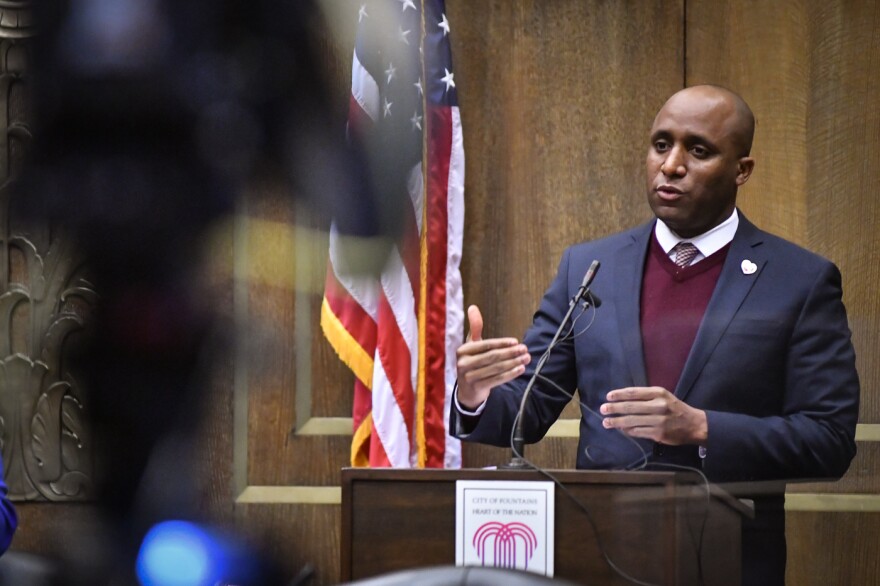Kansas City, Missouri, stands to receive about $195 million under the latest coronavirus relief plan, which President Joe Biden signed into law Thursday afternoon.
Mayor Quinton Lucas called it a life saver for a city facing a $70 million budget shortfall.
“This allows us to not only replenish our cash reserves, but also to continue to try to enhance our public services,” Lucas said on KCUR’s Up To Date.
The stimulus plan provides $350 billion to municipalities, which can be used to pay for COVID-19 response efforts or economic fallout from the pandemic.
It’s more than double the amount some Republicans in Congress backed late last year in a bipartisan compromise, but Lucas rejected the idea that cities would spend the money recklessly.
“There are significant amounts coming, (but cities) are not planning to spend this on new Taj Mahals or anything like that,” he said. “We will start with being responsible before we start a list of things that are more like desires or wants.”
Instead, Lucas said he’d like to see the funds used to replenish the city’s reserve fund, about $50 million of which was spent last year. Lucas said some of the money could be used to improve public services like street resurfacing and snow removal, and expand social services like mental health care or establishing a housing trust fund.
Other municipalities in the area are anticipating direct federal aid as well, but officials were less willing to say what the money would be used for because it’s still unclear what restrictions they are subject to under the new law.
“We do anticipate further regulatory clarification coming out as to what it can and can't be used for,” said Tim Danneberg with the Olathe, Kansas, city manager’s office. “At this point, we’re still in the discovery phase and clarification phase.”
As for how much Olathe could receive, Danneberg said he’s seen conflicting numbers, but “I know that it's been reported in the neighborhood of $19-$20 million.”
“We have not had official notification yet,” he said.
That’s about the same amount Overland Park, Kansas, Communications Manager Sean Reilly expects his city to receive, though they are also awaiting official word.
“We know that (the funds will) go toward one-time expenses, but exactly what we don't know,” he said. “We're not going to get any more in the future, so we can't count on it to cover any future ongoing deficit.”
Lee’s Summit, Missouri, City Manager Steve Arbo said that city looks to receive almost $9.3 million in federal money, which will likely be spent similarly to the last round of COVID-19 relief.
Much of that money, he said, went to medical expenses, public health, payroll expenses like overtime, and compliance of public health measures.
“And then we, with purpose, we reassigned some of the funds out for economic support, and also to nonprofit organizations that were assisting us in helping the community recover from COVID,” Arbo said.
City officials in Kansas and Missouri were quick to point out that any eventual spending of federal relief funds would require approval from their respective city councils.

A tale of two relief packages
Under last year’s CARES Act, aid was funneled through county governments, which then dispersed it to municipalities. Only cities with populations bigger than 500,000 received money directly from the federal government.
“That led to unnecessary political debate,” Lucas said. “I do not think in any way Kansas City, Missouri, got what it needed to respond to the COVID-19 crisis.”
In contrast, the American Rescue Plan of 2021 provides direct relief to cities and towns. The new structure seemed to please both Lucas and those at the county level.
“I feel really, really good that we don't have to deal with Kansas City on this, and that they're getting direct funding,” said Platte County Presiding Commissioner Ron Schieber. “Quite frankly, that's the way it should have been done the first time.”
Platte County has received criticism from Lucas and others because they have yet to disperse any CARES Act funding to Kansas City.
Schieber insists Kansas City’s request for funding has been approved, but the process for dispersing those funds has taken some time to work through. That’s partly because the city must spend the funds before they can be reimbursed, he said, and partly because Platte County only recently received the required reimbursement documentation from Kansas City.
“We can't disperse the money … until we have the documentation that these are truly COVID-related, (non-budgeted) expenses,” he said.
Schieber couldn’t say when those funds would be released to Kansas City, but said the city auditor was in the process of reviewing the documentation.
Schieber also said Platte County will receive federal aid money under the new plan, to the tune of about $20 million.
“County government’s not the appropriate vehicle, in my opinion, for distributing grants,” he said, “but we're going to do our best because the other cities in Platte County that are not receiving direct funding are going to be relying on us.”
Kansas City will have to wait at least a couple weeks for disbursement of the new funds, according to Lucas. For municipal leaders throughout the region who have waited close to a year for more federal help, it’s a day that can’t come soon enough.
“I know there will be many that want us to kind of go back and act like it's old spending times, but we learned something from this moment,” he said. “I want to make sure that for that next calamity and that next mayor — whatever it may be — we're set up well for it.”






